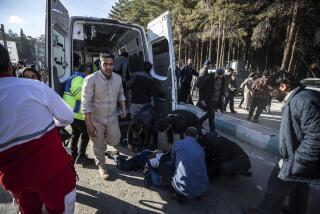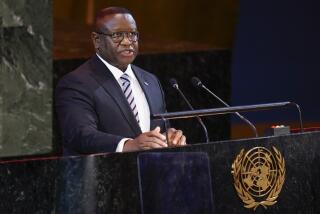Cairo bombings kill at least six
CAIRO — A series of explosions across Cairo on Friday killed at least six people, injured scores of others and fueled fears that Islamist insurgents were bringing their battle against Egypt’s military-backed government to the capital.
The four attacks, inaugurated by a massive early-morning vehicle bomb outside a central security headquarters, came despite tight security on the eve of the third anniversary of the uprising that toppled Hosni Mubarak. Interim President Adly Mansour urged supporters of the government to come out to mark the occasion, which is also a holiday celebrating the nation’s police force.
Mansour was quoted by state media as pledging to “root out” any group threatening state security. The interior minister had already pledged to deal harshly with any disruption of Saturday’s commemorations — a clear warning to supporters of deposed President Mohamed Morsi, who have also vowed to take to the streets.
Clashes around the country Friday between security forces and Morsi’s backers were reported to have left 14 people dead.
A powerful explosion outside a police headquarters in downtown Cairo was the largest and deadliest of the day’s blasts, killing at least four people. It shattered windows nearly half a mile away, carpeted the roadway with scorched debris and seriously damaged Cairo’s recently renovated Museum of Islamic Art, a stately 19th century treasure house directly across the street.
About three hours later, a smaller blast occurred near a metro station a few miles away, killing one person, according to the Health Ministry. Shortly after that, a third explosion was reported near a police substation, with no reports of casualties. A fourth blast, in the early evening near a cinema, killed one person, state television said.
A credible claim of responsibility for all four attacks emerged late Friday from a Sinai-based militant group called Ansar Bayt al Maqdis, or Partisans of Jerusalem. However, the interim government has consistently blamed Morsi’s Muslim Brotherhood for such attacks, even when another group claims responsibility. The government said it had identified three suspects but did not disclose any affiliations.
In the aftermath of the security headquarters bombing, angry onlookers gathered outside a cordon of riot police, many shouting slogans against Morsi and in favor of army chief Gen. Abdel Fattah Sisi, who with popular backing ousted Morsi in July and is expected to disclose soon whether he will run for president.
“What we need is for more of them to be put in jail, or put to death,” Adel Reda said grimly, referring to members of the Muslim Brotherhood. Others waved placards bearing the image of Sisi’s sunglasses-clad visage.
Friday is the main Muslim prayer day and a weekend day in Egypt, so few passersby were on the streets when the first bomb went off just after 6:30 a.m. The fatalities were thought to be mostly police on duty at the headquarters. But more people were out and about when the second and third blasts hit at midmorning, and still more when the fourth explosion occurred.
Attacks against the security forces are commonplace in the Sinai Peninsula, where police and army are battling a low-level insurgency, but they are still a relative rarity in major Egyptian cities. The last major strike in Cairo proper was a suicide bombing in September aimed at the interior minister, who escaped unharmed.
A bombing a month ago at a security headquarters in the northern city of Mansoura killed at least 15 people and prompted the interim government to declare the Muslim Brotherhood a terrorist group, even though Ansar Bayt al Maqdis claimed responsibility.
Special correspondent Amro Hassan contributed to this report.
More to Read
Sign up for Essential California
The most important California stories and recommendations in your inbox every morning.
You may occasionally receive promotional content from the Los Angeles Times.










